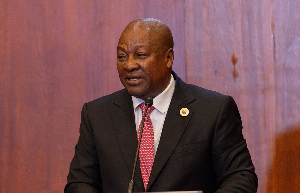According to the analysis of the 2017 National Budget, focused on the food and agricultural sector, the Planting for Food and Jobs policy which is expected to provide 750,000 jobs, is laudable because it has the potential of absorbing unemployed youth as well as increase productivity, food security and the nutritional status of families.
The report also said the "One District, One Factory" policy should prioritise agro-industries due to their employment and income generation potential. Such a strong linkage will contribute to enhancing the quality of and the demand for farm produce.
It also urged government to increase core funding to the agricultural sector and resist the temptation of resorting to the Annual Budget Funding Amount (ABFA) as a substitute.
“ABFA, which is derived from oil revenue, is not a stable source of funding for the sector giving price volatility of oil. A drop in oil prices, which has been the trend in recent times, would mean less oil revenue,” it said.
“Reliance, therefore, on oil revenue alone for the sector’s growth has the potential of negatively impacting on government’s ability to fund investment expenditure in the sector.”
This was made known at a National Stakeholders Conference on Agriculture, organised by Feed the Future’s Northern Ghana Governance Activity (NGGA) to create a platform for stakeholders to discuss potential strategies to ensure the sustainability of agriculture in Ghana.
It is a five-year programme supported by the United States Agency for International Development (USAID) and implemented by a consortium of nonprofits led by CARE International.
Other implementing partners include Action Aid Ghana, SEND-Ghana and WANEP, Ghana.
The report urged government to come clear on the amount of financial resources needed to execute the Planting for Food and Jobs policy.
It said the policy, which was expected to provide 750,000 jobs, was laudable because it had the potential of absorbing the unemployed youth as well as increase productivity, food security and nutritional status of families.
Mr Gregory Titigah, the Civil Society Organisations Strengthening and Advocacy Coordinator of NGGA, presenting the report, said it recommended that government should be clear on the source of funding for the proposed employment of 3,200 extension officers and 1,000 unemployed graduates for the Planning for Food and Jobs campaign.
He said government must pay attention to the implementation of the programme which, he said, has a huge potential to boost local food production, improve food security, and nutrition as well as provide employment.
Mr Titigah said government needed to do more in meeting its core funding obligations to the Ministry and reduce dependence on funding from donor support and ABFA, given the challenges associated with those two funding sources.
He suggested that MOFA should be allowed to retain a higher percentage of its Internally Generated Funds to fund goods and services.
Participants noted that the country needed to generate funding internally to support the agricultural sector instead of over relying on donor funds.
In a related story, Hon. Kwame Asafu-Adjei, Chairman of the parliamentary select committee on agriculture, said farmers, for that matter smallholders, should be given more money to expand their businesses.
"I think we have come to the age that a country of about 28 and over million people and all of us eat each day and if we want to support the smallholder, then, our number one priority in terms of budgetary allocation if I'm the President, I'll ensure that about 70% of the country budget allocation goes into agriculture,” he stated.
“Why am I saying this? Because without farmers we wouldn't be here. If you eat good food, you don't need to see the doctor nor go to the drugstore. So why don't we spend all our money for farmers to produce nutritionally balanced diet for all of us?
“If we all remember, in the ’70s and ’80s when the economy was good, most of us were in the poultry industry. It was vibrant and all the youths were in the poultry business because the micro economy was good."
Continuing, he said: "We're going to revamp agriculture. We are going to make agriculture as it used to be during and after independence. If you are able to produce enough, the government will assist you in processing and adding value to whatever commodity you produce.
“I'm also encouraged that, as the inflation rate is dropping, it will have effect on the interest rate and the tractors, which they are selling at Gh¢ 80,000, would come down to somewhere Gh¢30 to 40,000. But it should be spread over.
“Farmers don't have to pay cash, I'm hoping. Because we are going to meet the minister, we'll tell him there is the need to spread over. In fact, there should be subsidy, I believe in subsidy. The World Bank doesn't believe in subsidy, but they provide subsidy to developed countries," Hon. Asafu-Adjei opined.
Business News of Saturday, 22 July 2017
Source: classfmonline.com













